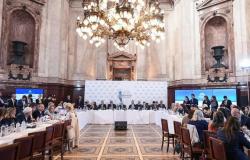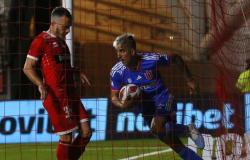Martín Buscaglia returns to take a walk around this part of Patagonia. It’s not for nothing that the tour is called Eternal Return to the South. And the first thing he says is that he once again feels the urge to release a new album. Two good news, what is coming and what soon there will be his music, in times where they are not abundant. Neither the good news nor the good new music. These are times of many and not always good music. Or, as he will say in this interview with RÍO NEGRO Diarythis very bulimic and current way of making and consuming music.
Martín Buscaglia, Uruguayan singer-songwriter and producer, from Montevideo since ’72, will offer a series of five shows in the region starting in Bariloche, this Wednesday, at the Cultural Power Plant Theater; following Thursday, in Rock Culture House; on Friday, at Osvaldo Bayer Popular Library, from Villa la Angostura; on Saturday at Espacio Trama, from San Martín de los Andes; and next Sunday in the Galeano Cultural Center, El Bolsón. All concerts are at 9 p.m. and tickets for each of them are available at the respective box offices and through eventbrite.com. ar, except for San Martín de los Andes, available through ventasweb.com.ar.
About to start a tour made of new songs and the usual onesthe question was obvious when it came to someone like Buscaglia, whose last own album dates back to March 2020: What’s new, Martin? “I’m starting to feel the urge to record a new album,” he says.
And he explains: “I don’t agree much with this current bulimic way of consumption that focuses more on the quantity and the packaging than on what is inside. There are thousands of launches as a commercial requirement. As if you are not present all the time you disappear and that is not the case. You disappear if The music you make has no bottom, “it has no spell,” says this author of a songbook as original as it is typical of a Uruguayan tradition of making songs.
“In general, I take my time, a lot, between album and album. It’s not that I stopped making music, yesterday (last Thursday, the note was made on Friday) I delivered some things that I did with Fernando Cabrera, I did things for Liliana Herrero, Kevin Johansen that are going to come out in the year. I have respect for releasing an album, I’m still old school. For me an album is like a book”, he reveals, and boy did he.
A lot of time has passed since that initiation “Llevenlé” (2006) to “Enough of music” (2020) his last official foray into a studio. In the middle, the live “Somos libre” (2014) and two collaborations, with Kiko Veneno and the eccentric Uruguayan artist Antolínin “The indomable pepper” (2014 and “Musical experiences” (2015), respectively. But all that is the past because as he will say enthusiastically: I’m in the process of bringing a record to ground I don’t think it will come out this year, but it will come out next year.”
Buscaglia, guitar, song
Regarding the shows he will offer starting this Wednesday in the region, he warns that he will be alone because that is how he now imagines making music. Yeah, who knew how to be the orchestra man, Today it is reduced only to the good company of its good friend the Creole guitar, which, as he will say later, has it all.
“I’m going to be alone on stage and it’s something very nice that the years give you,” he begins by saying about it, and says: “I always liked when I saw one of the musicians I followed, Spinetta, Caetanothat at some point in their shows they were alone on stage and some topics were touched on. They were the best moments, beyond the incredible bands they always had. But time gives you that because you already have a way of being on stage, of tightening the strings and saying the words you were saying. And I know that a Creole guitar has everything my music can contain.”
Buscaglia recognizes that moment when he discovered that in the Creole there was everything he needed to make his music, a moment involving Kiko Veneno. “There is a specific moment,” he says, “because he always played with a band and when I started traveling more to Argentina, Spain, I started working with loops and other instruments. I played with a very, very old guitar that belonged to my family and I still have it, but, at one point, Kiko Veneno told me ‘hey, you can’t play anymore with that guitar in pieces’ and he gave me a flamenco guitar from a luthier from Cádiz. To break it in, as one breaks in a new car, I put on a series of concerts in Buenos Aires, alone with the guitar, with the simple objective of softening her and starting to get to know her. I did those concerts with the guitar and Javier (Tenenbaum), my manager, recorded them and made me listen to them. He my said listen to this because it has a particular swing and he was right. And from that moment that portal opened for me and now I will tell you that what I play the most is only with the guitar. My place of greatest discovery is like this, alone.”
Buscaglia believes that with Their last album so far opened up as a kind of new path who doesn’t know where it will take him. He identifies a certain rhythm in all of his works, but that, in each of them, he refined outside of any plan. In Basta de Música he sees an emphasis on percussion and grooves. invented under the inevitable influence of Eduardo Mateo, “the one in those things, just like Hugo Fatorusso.” And in the lyrics of that album, a lyrical work that also imagines an endless path.
Finally, this time for a question: what is the song for Martín Buscaglia? “The song is not important,” he says, paraphrasing to himself. Let’s explain this: Buscaglia has just edited “Dos Patos” (Criatura Editora), a songbook with 22 of his most emblematic songs. This selection was based, among other things, on the possibility of transcription and playability on the guitar, with the collaboration of Martín Ibarburu, Martín Ibarra and Nacho Mateu. There are chords, but also clarifications and even some videos from Buscaglia himself.
That being said, let’s continue. Buscaglia will bring the book in question, will talk about him. And that book, which has already sold out its first edition and is going into a second, has a text that talks about what the song is whose first sentence says “A song is not important”. And he explains it: “I think the song is much more than the sum of its elements or the quality of its elements separately. In the end, it is magic. How does that happen? It is ungraspable. That’s why it continues to be necessary and it changes your life to suit itself, it makes you who you are.”





